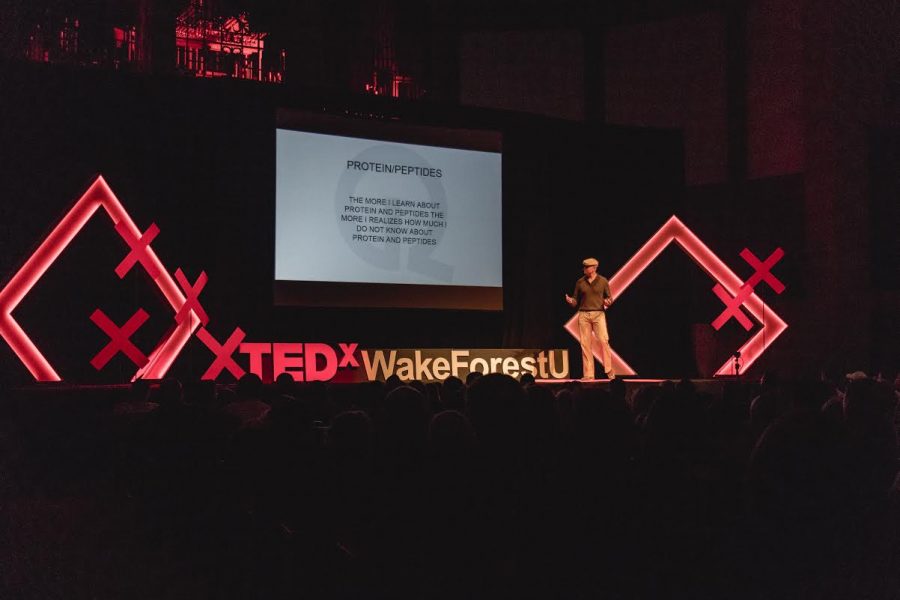This past Saturday, Feb. 17, students, faculty, and staff from Wake Forest University — along with community members from the Winston-Salem area — gathered together to listen to speakers from all over the world share their expertise at TEDxWakeForestU.
From the start, the atmosphere brimmed with anticipation and excitement as Arthur Willson, the event’s Lead Organizer and Student Curator, introduced the event and the year’s theme, “The Broken Box.” Following the event, Willson described a brainstorming session where a member of the organizing team discussed the importance of thinking outside the box. “Why are there boxes in the first place?” the team asked as the conversation shifted. An urge to think differently became what Willson describes as an exploration into the question of “what are those boxes that are keeping us from our full potential, and what innovative ways can we — not only think outside of them — but completely break them, shaping our futures and also the future of the world?”
This year’s TEDx topics ranged from how to empower entrepreneurs worldwide to the potential for blockchain technology; from human capacity to solve problems aided by artificial intelligence to combatting neurodegenerative diseases with improvisational dance; from ending human trafficking to redefining the medical delivery system and living life to its fullest potential. Presenters examined new and old problems from different perspectives to empower us to redefine the future for ourselves and for others.
“I was really impressed with the topic variability and aesthetic presentation of the TEDx event,” freshman William Zhang said.
Following his talk, Fred Blackburn, the Executive Vice President of Booz Allen Hamilton, discussed how his topic related to the overall theme of the event.
“I give talks about [Artificial Intelligence] a fair bit, and I think [this notion of thinking outside of the box is] about getting past the fear; [to start] thinking about the possibilities,” Hamilton said.
This sentiment was echoed by his son, freshman Kyle Blackburn. “[These ideas] are much more ‘the road less traveled by,’ which helped me expand my vision of what the world could be and see the new possibilities in the future to help me envision my role in that.”
As college students, the broken box theme is especially salient. In today’s world, many students enter as freshmen knowing they are “pre-med” or “pre-business” — a self imposed limitation on what one can study. During an interview, Zoe Walling, the Master of Ceremonies for TEDxWakeForestU, shared, “the broken box is a more active and empowering way for you, as an individual, to overcome whatever hurdles you may face.”
Speaker Peter Cortle discussed hurdles entrepreneurs face daily. In his work with Cornell students and faculty, he assists them in identifying their creative visions and overcoming potential limitations, allowing them to reach their goals. Life contains many boxes, Cortle conveyed, and each person met — or new resource, connection or opportunity gained — is one more box broken. Each broken box can facilitate personal growth and expands one’s scope of influence. His platform, StartupTree, bridges the gap between investors and entrepreneurial students and alumni. Each connection he makes, and each connection he facilitates, pushes every party involved one step closer to their true potential.
After the death of a close friend, Sebastian Terry, another inspiring presenter, realized he was not happy with his life and had not achieved all he desired. He created a list of 100 things that would add meaning to his life. After sharing a few items he checked off, such as crashing a red-carpet event and marrying a stranger in Las Vegas, he transitioned to his new purpose: empowering others to achieve their goals in life. His personal list, he realized, was really a platform he could use to inspire others to fulfill their dreams and aspirations.
Both Cortle and Terry embody the generous spirit of this year’s TEDxWakeForestU speakers who imparted an amazing gift: a precedent. Collectively, they showed that whatever the challenges in life may be, by not only thinking outside the box, but breaking — and redefining those borders — people can understand what they want in life.














